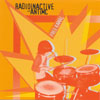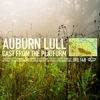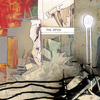LTM
The songs on
Night Air 2evoke the experience of walking across wet cobblestones slick withrain, ducking under awnings of sidewalk cafes and antiquarianbookstores, aimless and anonymous in an unfamiliar city at night.Blaine L. Reininger, a native of Colorado who has lived in Europe sincethe early 1980s, draws heavily upon his expatriate sense ofisolation—geographic, linguistic and emotional—to create an articulatesuite of mature pop songs. Most will know Reininger from his more than20-year stint as frontman for the intermittently brilliant groupTuxedomoon, creators of
Half-Mute,
Desire and handful ofessential art-punk classics. In the long gaps between the group'speriods of activity, Reininger has pursued a fruitful solo career,releasing a string of baroque pop albums highlighting his talent as amulti-instrumentalist and witty lyricist. This album is billed as asequel to 1984's
Night Air, but that's a bit misleading, as itwould be more aptly described as a best-of, consisting of 15hand-picked tracks from albums and soundtracks recorded between 1989and 1999. All of this material has been available previously, but invery rare pressings on Belgium's Crepuscule and other small Europeanlabels. As he has done on so many Tuxedomoon releases, Reininger playsviolin and viola throughout
Night Air 2, building each songfrom multi-tracked layers of dark, swooning strings. The rest of thesound is filled out with an assortment of synthesizers, keyboards andrhythm boxes, adding up to an urbane, metropolitan sound that matchesthe sophistication of a Stan Ridgeway or Gavin Friday, with its ownunique Kafka-esque atmospheres. Reininger is fascinated by the noirexpressionism of Fritz Lang films and Fritz Bleyl woodcuts, and hisparanoid, cinematic atmospheres perfectly capture this zeitgeist. Attimes, the swirl of overlapping strings resembles the sound of aone-man chamber quartet covering Anton Karas' soundtrack to
The Third Man.I've heard other modern versions of this noir sound—I'm thinking of themusic of Barry Adamson and Goldfrapp—but Reininger's approach has theworldly appeal and poise of a veteran. The thick, textural glissandi of"Night Ride" careen down dimly lit nocturnal boulevards, carriedforward by propulsive keyboards. "Winter in Wien" is the first of athree-part song suite entitled "Europe After the Rains," a sentimentalhomage to Max Ernst which doubles as an atmospheric meditation on theprofound sense of history the solitary traveler experiences in oldEurope. The songs switch freely between spoken-work beatnik recitationsand refrains sung in English or French.
Night Air 2 displays anintelligence and elegance so rare in modern pop music that at firstlisten it seems entirely foreign, but is all the more welcome for it.
samples:
 We need another forced dance music sub-genre like we need more ironicmullets. Rephlex's press for this compilation talks valiantly about howit's just the music and not the labels to which we should be payingattention, but then it goes and hypes this new style dance music hybridcalled "Grime". Grime to me would indicate a real layer of dirt,menace, or sonic or thematic depravity, but none of that is to be foundin these polished dancefloor stompers that bridge the artificial gapsbetween electro, drum n bass, garage and just about every other clubmusic popular in the last five years. The fact that some of this stufflike MarkOne's "Raindance" is pretty catchy as far as club music goesis overshadowed by the presentation and the conceit that this is a newscene and new sound to be gobbled up before it's past its prime. Imean, isn't that the general modus operandi of nearly all dance music?Every innovation and genre splice is just a way to keep peoplelistening to what are otherwise thousands of tons of vinyl that isproduced with a strict formula in mind. Grimeis most certainly meant for the dancefloor as it lacks the variationand depth of contemporary electronic listening music. The patterns andrepetition are designed to make people move, and move they will untilenough records within this tempo range with these kinds of trademarkscome out. After that, we'll get a new bin in the DJ stores for"Post-Grime" or something. The problem with this record to me is thatit purports to pioneer something, but there's nothing here that wouldsound fresh to anyone but the most ardent genre-hound. It's music madefor a select audience, and in that I'm sure it succeeds as theproducers here prove they have plenty of chops for creating bouncybreakbeats and thumping bass. However, I find it unlikely that Grimewill interest anyone outside of the stuffy world of snotty DJ circlesand trendy club kids. It certainly didn't do much for me.
We need another forced dance music sub-genre like we need more ironicmullets. Rephlex's press for this compilation talks valiantly about howit's just the music and not the labels to which we should be payingattention, but then it goes and hypes this new style dance music hybridcalled "Grime". Grime to me would indicate a real layer of dirt,menace, or sonic or thematic depravity, but none of that is to be foundin these polished dancefloor stompers that bridge the artificial gapsbetween electro, drum n bass, garage and just about every other clubmusic popular in the last five years. The fact that some of this stufflike MarkOne's "Raindance" is pretty catchy as far as club music goesis overshadowed by the presentation and the conceit that this is a newscene and new sound to be gobbled up before it's past its prime. Imean, isn't that the general modus operandi of nearly all dance music?Every innovation and genre splice is just a way to keep peoplelistening to what are otherwise thousands of tons of vinyl that isproduced with a strict formula in mind. Grimeis most certainly meant for the dancefloor as it lacks the variationand depth of contemporary electronic listening music. The patterns andrepetition are designed to make people move, and move they will untilenough records within this tempo range with these kinds of trademarkscome out. After that, we'll get a new bin in the DJ stores for"Post-Grime" or something. The problem with this record to me is thatit purports to pioneer something, but there's nothing here that wouldsound fresh to anyone but the most ardent genre-hound. It's music madefor a select audience, and in that I'm sure it succeeds as theproducers here prove they have plenty of chops for creating bouncybreakbeats and thumping bass. However, I find it unlikely that Grimewill interest anyone outside of the stuffy world of snotty DJ circlesand trendy club kids. It certainly didn't do much for me. 


 Hip-hop records live and die by their MCs. A DJ can cut as crazy as hewants and a producer can mine the weirdest record bins this side of themoon but if the MC isn't solid, the record will fall flat.Unfortunately, that's what happens for this ambitious work fromRadioinactive and Antimc. While the music is quirky, unpredictable andsufficiently groovy, the vocals just do not work for me. This is moreof that self-described 'art rap' that mixes stiff rhymes and heady freeverse with off-beat production and live instrumentation, and while someof it is fun, this just isn't. Fans of similar Mush artists will likelyenjoy Radioinactive's flow, but the too-direct, too-choppy,too-preachy, too-simple rhymes often come off as amateurish andill-performed. Spitting out words over a beat is an art, and one that'sa lot harder to do well than most people seem to think. While some ofRadioinactive's contemporaries have an off-kilter delivery that worksbecause it's strange and fresh, most of Free Kamalreminds me of one of those files you might find online of a kid rappinginto a webcam. If Mush had gone the Cex/Dr. Octagon/Cannibal Ox routeof releasing an instrumental and vocal copy of Free Kamal, I'm sure I'd pop it in more often, but as it stands, the record has a fatal flaw that I just can't get past to enjoy.
Hip-hop records live and die by their MCs. A DJ can cut as crazy as hewants and a producer can mine the weirdest record bins this side of themoon but if the MC isn't solid, the record will fall flat.Unfortunately, that's what happens for this ambitious work fromRadioinactive and Antimc. While the music is quirky, unpredictable andsufficiently groovy, the vocals just do not work for me. This is moreof that self-described 'art rap' that mixes stiff rhymes and heady freeverse with off-beat production and live instrumentation, and while someof it is fun, this just isn't. Fans of similar Mush artists will likelyenjoy Radioinactive's flow, but the too-direct, too-choppy,too-preachy, too-simple rhymes often come off as amateurish andill-performed. Spitting out words over a beat is an art, and one that'sa lot harder to do well than most people seem to think. While some ofRadioinactive's contemporaries have an off-kilter delivery that worksbecause it's strange and fresh, most of Free Kamalreminds me of one of those files you might find online of a kid rappinginto a webcam. If Mush had gone the Cex/Dr. Octagon/Cannibal Ox routeof releasing an instrumental and vocal copy of Free Kamal, I'm sure I'd pop it in more often, but as it stands, the record has a fatal flaw that I just can't get past to enjoy. This collection proves that Best Of is truly a relative term. In the case of Anna Domino (nee' Anne Taylor), the term is relative to the generally poor quality of her tired, continental pop. So, Best Of need not necessarily indicate quality in and of itself. And if the songs on Dreamback are indeed the cream of Anna Domino's extensive back catalog, I think I can safely steer clear of her albums.
This collection proves that Best Of is truly a relative term. In the case of Anna Domino (nee' Anne Taylor), the term is relative to the generally poor quality of her tired, continental pop. So, Best Of need not necessarily indicate quality in and of itself. And if the songs on Dreamback are indeed the cream of Anna Domino's extensive back catalog, I think I can safely steer clear of her albums. If Belgian group Bernthøler are remembered at all, they are rememberedfor their classic 1984 single "My Suitor," a cello-driven slice ofsweetly downbeat chamber pop. It was a favorite of legendary BBC radioDJ John Peel, and became a cult underground hit for the Brusselsquartet. They released a couple subsequent singles that failed to makewaves, committed some demo tracks to tape and disbanded in 1985. Lapdissolve two decades later, and LTM has put together a definitivecollection of this all-but-forgotten band. Comprising the completestudio recordings of the band, released and unreleased, Merry Lines in the Skyalso includes three Quicktime videos, including one for "My Suitor."I've listened to the disc a couple of times through now, and havestruggled for something positive to say about the rest of Bernthøler 'smaterial. Unfortunately, it seems that success and longevity eludedBernthøler as a direct consequence of the quality of their music, andnot by some cruel accident of fate. Where "My Suitor" succeeds becauseof its minimal arrangements and Albanian-born singer Drita Kotaji'ssoftly expressive couplets, the rest of the tracks collected here failto distinguish themselves at all. This is not to say that Bernthølerare utterly devoid of talent; merely that they rather unremarkablyapproximate the "coldwave" sound of their contemporaries, echoed byother bands like The Cure and Antena. Kotaji's tuneless vocals franklybecome a little grating over the course of the disc, and theoversimplified arrangements often work to the detriment of the songs.Many of these tracks seem underwritten and stunted, suffering from apaucity of ideas, interesting as fragments but ultimately notcompelling. For those who remember "My Suitor" fondly and haven't beenable to find any of the compilations on which it has appeared over theyears, you could probably do worse than dropping a ten-pound note topurchase Merry Lines, and it's possible you might find the other 14 tracks pleasant. Just don't expect to uncover some unjustly obscure gem.
If Belgian group Bernthøler are remembered at all, they are rememberedfor their classic 1984 single "My Suitor," a cello-driven slice ofsweetly downbeat chamber pop. It was a favorite of legendary BBC radioDJ John Peel, and became a cult underground hit for the Brusselsquartet. They released a couple subsequent singles that failed to makewaves, committed some demo tracks to tape and disbanded in 1985. Lapdissolve two decades later, and LTM has put together a definitivecollection of this all-but-forgotten band. Comprising the completestudio recordings of the band, released and unreleased, Merry Lines in the Skyalso includes three Quicktime videos, including one for "My Suitor."I've listened to the disc a couple of times through now, and havestruggled for something positive to say about the rest of Bernthøler 'smaterial. Unfortunately, it seems that success and longevity eludedBernthøler as a direct consequence of the quality of their music, andnot by some cruel accident of fate. Where "My Suitor" succeeds becauseof its minimal arrangements and Albanian-born singer Drita Kotaji'ssoftly expressive couplets, the rest of the tracks collected here failto distinguish themselves at all. This is not to say that Bernthølerare utterly devoid of talent; merely that they rather unremarkablyapproximate the "coldwave" sound of their contemporaries, echoed byother bands like The Cure and Antena. Kotaji's tuneless vocals franklybecome a little grating over the course of the disc, and theoversimplified arrangements often work to the detriment of the songs.Many of these tracks seem underwritten and stunted, suffering from apaucity of ideas, interesting as fragments but ultimately notcompelling. For those who remember "My Suitor" fondly and haven't beenable to find any of the compilations on which it has appeared over theyears, you could probably do worse than dropping a ten-pound note topurchase Merry Lines, and it's possible you might find the other 14 tracks pleasant. Just don't expect to uncover some unjustly obscure gem. The songs on Night Air 2evoke the experience of walking across wet cobblestones slick withrain, ducking under awnings of sidewalk cafes and antiquarianbookstores, aimless and anonymous in an unfamiliar city at night.Blaine L. Reininger, a native of Colorado who has lived in Europe sincethe early 1980s, draws heavily upon his expatriate sense ofisolation—geographic, linguistic and emotional—to create an articulatesuite of mature pop songs. Most will know Reininger from his more than20-year stint as frontman for the intermittently brilliant groupTuxedomoon, creators of Half-Mute, Desire and handful ofessential art-punk classics. In the long gaps between the group'speriods of activity, Reininger has pursued a fruitful solo career,releasing a string of baroque pop albums highlighting his talent as amulti-instrumentalist and witty lyricist. This album is billed as asequel to 1984's Night Air, but that's a bit misleading, as itwould be more aptly described as a best-of, consisting of 15hand-picked tracks from albums and soundtracks recorded between 1989and 1999. All of this material has been available previously, but invery rare pressings on Belgium's Crepuscule and other small Europeanlabels. As he has done on so many Tuxedomoon releases, Reininger playsviolin and viola throughout Night Air 2, building each songfrom multi-tracked layers of dark, swooning strings. The rest of thesound is filled out with an assortment of synthesizers, keyboards andrhythm boxes, adding up to an urbane, metropolitan sound that matchesthe sophistication of a Stan Ridgeway or Gavin Friday, with its ownunique Kafka-esque atmospheres. Reininger is fascinated by the noirexpressionism of Fritz Lang films and Fritz Bleyl woodcuts, and hisparanoid, cinematic atmospheres perfectly capture this zeitgeist. Attimes, the swirl of overlapping strings resembles the sound of aone-man chamber quartet covering Anton Karas' soundtrack to The Third Man.I've heard other modern versions of this noir sound—I'm thinking of themusic of Barry Adamson and Goldfrapp—but Reininger's approach has theworldly appeal and poise of a veteran. The thick, textural glissandi of"Night Ride" careen down dimly lit nocturnal boulevards, carriedforward by propulsive keyboards. "Winter in Wien" is the first of athree-part song suite entitled "Europe After the Rains," a sentimentalhomage to Max Ernst which doubles as an atmospheric meditation on theprofound sense of history the solitary traveler experiences in oldEurope. The songs switch freely between spoken-work beatnik recitationsand refrains sung in English or French. Night Air 2 displays anintelligence and elegance so rare in modern pop music that at firstlisten it seems entirely foreign, but is all the more welcome for it.
The songs on Night Air 2evoke the experience of walking across wet cobblestones slick withrain, ducking under awnings of sidewalk cafes and antiquarianbookstores, aimless and anonymous in an unfamiliar city at night.Blaine L. Reininger, a native of Colorado who has lived in Europe sincethe early 1980s, draws heavily upon his expatriate sense ofisolation—geographic, linguistic and emotional—to create an articulatesuite of mature pop songs. Most will know Reininger from his more than20-year stint as frontman for the intermittently brilliant groupTuxedomoon, creators of Half-Mute, Desire and handful ofessential art-punk classics. In the long gaps between the group'speriods of activity, Reininger has pursued a fruitful solo career,releasing a string of baroque pop albums highlighting his talent as amulti-instrumentalist and witty lyricist. This album is billed as asequel to 1984's Night Air, but that's a bit misleading, as itwould be more aptly described as a best-of, consisting of 15hand-picked tracks from albums and soundtracks recorded between 1989and 1999. All of this material has been available previously, but invery rare pressings on Belgium's Crepuscule and other small Europeanlabels. As he has done on so many Tuxedomoon releases, Reininger playsviolin and viola throughout Night Air 2, building each songfrom multi-tracked layers of dark, swooning strings. The rest of thesound is filled out with an assortment of synthesizers, keyboards andrhythm boxes, adding up to an urbane, metropolitan sound that matchesthe sophistication of a Stan Ridgeway or Gavin Friday, with its ownunique Kafka-esque atmospheres. Reininger is fascinated by the noirexpressionism of Fritz Lang films and Fritz Bleyl woodcuts, and hisparanoid, cinematic atmospheres perfectly capture this zeitgeist. Attimes, the swirl of overlapping strings resembles the sound of aone-man chamber quartet covering Anton Karas' soundtrack to The Third Man.I've heard other modern versions of this noir sound—I'm thinking of themusic of Barry Adamson and Goldfrapp—but Reininger's approach has theworldly appeal and poise of a veteran. The thick, textural glissandi of"Night Ride" careen down dimly lit nocturnal boulevards, carriedforward by propulsive keyboards. "Winter in Wien" is the first of athree-part song suite entitled "Europe After the Rains," a sentimentalhomage to Max Ernst which doubles as an atmospheric meditation on theprofound sense of history the solitary traveler experiences in oldEurope. The songs switch freely between spoken-work beatnik recitationsand refrains sung in English or French. Night Air 2 displays anintelligence and elegance so rare in modern pop music that at firstlisten it seems entirely foreign, but is all the more welcome for it. After releasing their acclaimed debut album in 1999, it was abundantlyclear that Auburn Lull have a firm grasp on the finer points ofshoegazer space rock, and their music holds a power that they alonecontrol and wield, letting it out in beautiful doses and specimens thatcan cause the heart and brain to swell. For their new album, they chosenot to branch out a great deal and keep the formula somewhat constant —not a bad thing but a firm limitation that has the potential toadversely affect the proceedings. There is growth in the band both asmusicians and songwriters, and it should not be said that the music isstagnating within this structure. However, at times on this album itfeels like the band is simply repeating themselves, working from acomfortable base but then not expounding. Some chances might be nice tohear, but ultimately the album is a satisfying one in many areas. Evensomething quite simple like the blending of songs from one into thenext is handled with an almost medical precision, and the mood nevershifts abruptly to jar one from the state of consciousness that isdeveloped. The echoes that are captured on these songs are those ofaching hearts and starving minds, of people miles apart though right inthe same room together, of flighty concepts of things in the walls andthe way things ought to be. Simple melodies and trickery abound, withsamples and echoed percussion joined by droned guitars and simple notesplucked and repeated. Atmosphere is key, as each song is practicallydrenched in the weight of a place and time as well as a feeling orwords. "Season of False Starts" illustrates this pursuit perfectly withbuild upon build, then, appropriately, false starts and stops, thevoice ghostly rendering the words "decades fall apart," among otherthings. It's almost like the music of lessons or voices from beyond thegrave will use, old Hamlet lecturing his son and saying "do notforget." While the album feels like they're referring to themselves,they also touch something far deeper within, and in those moments theyapproach the next stage in their evolution.
After releasing their acclaimed debut album in 1999, it was abundantlyclear that Auburn Lull have a firm grasp on the finer points ofshoegazer space rock, and their music holds a power that they alonecontrol and wield, letting it out in beautiful doses and specimens thatcan cause the heart and brain to swell. For their new album, they chosenot to branch out a great deal and keep the formula somewhat constant —not a bad thing but a firm limitation that has the potential toadversely affect the proceedings. There is growth in the band both asmusicians and songwriters, and it should not be said that the music isstagnating within this structure. However, at times on this album itfeels like the band is simply repeating themselves, working from acomfortable base but then not expounding. Some chances might be nice tohear, but ultimately the album is a satisfying one in many areas. Evensomething quite simple like the blending of songs from one into thenext is handled with an almost medical precision, and the mood nevershifts abruptly to jar one from the state of consciousness that isdeveloped. The echoes that are captured on these songs are those ofaching hearts and starving minds, of people miles apart though right inthe same room together, of flighty concepts of things in the walls andthe way things ought to be. Simple melodies and trickery abound, withsamples and echoed percussion joined by droned guitars and simple notesplucked and repeated. Atmosphere is key, as each song is practicallydrenched in the weight of a place and time as well as a feeling orwords. "Season of False Starts" illustrates this pursuit perfectly withbuild upon build, then, appropriately, false starts and stops, thevoice ghostly rendering the words "decades fall apart," among otherthings. It's almost like the music of lessons or voices from beyond thegrave will use, old Hamlet lecturing his son and saying "do notforget." While the album feels like they're referring to themselves,they also touch something far deeper within, and in those moments theyapproach the next stage in their evolution. The covers record is a grand art form, often abused, but with a conceptlike this one there's no way to go wrong. Sally Timms' latest soloalbum is primarily comprised of songs written by men, hence the title,and with anyone else some of the material might come off a bit tooforced. Timms takes these songs and, to her credit, does not change anywords or situations in the songs to make them work from a woman'sperspective. These performances are the original songs in newarrangements, brought about by Timms and the engineering/productionteam of Johnny Dowd and Justin Asher. The emphasis is on raw, however,with songs sometimes reduced in parts to just Timms' voice, aforeboding and sensuous being all its own. She has chosen some ratherinteresting specimens to emulate, from her other band the Mekons toMark Eitzel to Ryan Adams, and each interpretation bears a stamp thatwill never wash off in my mind. This makes it impossible to listen tothe original song without thinking of Timms' rendition, a testament toher artistry and originality when the tunes aren't even hers to beginwith. The two Mekons songs are especially moving, as her interpretationis informed by something deeper, so any changes could imply thatperhaps this is the way Timms always wanted the song to go; though theMekons are along for the ride, providing the music. Most of all, thisis a solo album of striking variation, with revealing and incrediblyprovocative imagery. The instrumentation involved alone is a wild ride,from musical saw to accordion to moog bass to strightforward guitar anddrums. Programming by Asher is never tiresome, and Timms' voice risingfrom a whisper to a plaintive wail and filling the room with nakedemotion is purely goosebump-inducing. By the time "Little Tommy Tucker"takes the speakers, I'm spent, and it's almost the bedtime story I needto fall asleep. It would be, that is, if it weren't so completelymesmerizing, with her frightening "none shall be married" refrainrepeating in my head so vividly that I may never sleep again.
The covers record is a grand art form, often abused, but with a conceptlike this one there's no way to go wrong. Sally Timms' latest soloalbum is primarily comprised of songs written by men, hence the title,and with anyone else some of the material might come off a bit tooforced. Timms takes these songs and, to her credit, does not change anywords or situations in the songs to make them work from a woman'sperspective. These performances are the original songs in newarrangements, brought about by Timms and the engineering/productionteam of Johnny Dowd and Justin Asher. The emphasis is on raw, however,with songs sometimes reduced in parts to just Timms' voice, aforeboding and sensuous being all its own. She has chosen some ratherinteresting specimens to emulate, from her other band the Mekons toMark Eitzel to Ryan Adams, and each interpretation bears a stamp thatwill never wash off in my mind. This makes it impossible to listen tothe original song without thinking of Timms' rendition, a testament toher artistry and originality when the tunes aren't even hers to beginwith. The two Mekons songs are especially moving, as her interpretationis informed by something deeper, so any changes could imply thatperhaps this is the way Timms always wanted the song to go; though theMekons are along for the ride, providing the music. Most of all, thisis a solo album of striking variation, with revealing and incrediblyprovocative imagery. The instrumentation involved alone is a wild ride,from musical saw to accordion to moog bass to strightforward guitar anddrums. Programming by Asher is never tiresome, and Timms' voice risingfrom a whisper to a plaintive wail and filling the room with nakedemotion is purely goosebump-inducing. By the time "Little Tommy Tucker"takes the speakers, I'm spent, and it's almost the bedtime story I needto fall asleep. It would be, that is, if it weren't so completelymesmerizing, with her frightening "none shall be married" refrainrepeating in my head so vividly that I may never sleep again.  Whimsy and fantasy are all it takes for Chris Barth to make a goodalbum. The lyrics on the album don't always make sense, but sometimesthey have a familiar sentiment that conjure up memories and ideas aboutthe world that might otherwise be forgotten. The whole of this recordworks like this: Barth's voice takes front and center on nearly everytrack and it is a gorgeous voice capable of both distress and relief.The music, when it isn't just an acoustic guitar, rolls along like agarage band trying to feel out its new equipment and this childlikeclumsiness is what marks the best songs on the album. In the meantimeBarth speaks out lyrics like "I'm gonna watch my baby trees grow / Overthe next fifty years I hope / I should have known I would hurt you likethat / I'll bet the farm I won't make it home." Not exactly the stuffof Byron or Whitman, but it's the way that he sings that makes thelyrics so important; it is as though they were written to fit aroundthe music and were not so much drawn up to convey deep, personalconvictions. The music, as a whole, is simplistic with arrangementsthat play on the addition of instruments in just the right place. "OurPlace in the Sky" is just a popping guitar rhythm with Barth's voicehighlighting the accents until a bass guitar begins to wrap all therhythm into a tide of melody and completes the song. "Watching YourHouse Burn" is a slow rhythmic intensification that pulses with all thereverb of layered acoustic guitars and the uneasy rumbling of drummachines. The opening lines, "I got poems on my shelf / I pick one offand raise a spell," are the epitome of the album and mark theprogression of this song and others. As the acoustic guitar races alongwith Barth's voice a tension is developed that relieves itself in thesound a heavy, thumping bass and the echo of a simple and repeatedlyrical theme. Most of these songs clock in at the two minute mark, butone outstanding and instrumental exception is "Sun Enters Capricorn."Whether or not the album's lyrics are completely convincing or even ifthey were just built around the songs after they were developed, Born a Black Diamondas a deliciously mystical aura. The guitar wailing and phased nuanceson "Sun Enters Capricorn" wobble and tumble like a living creature inits death throes. The drums on this track are noticeably heaviercompared to others and everything after this song seems to emanate outof this song, as though it were the most important piece. "The Balladof Normanoak" closes the album on a solemn and reverent note, as thoughthe music was all devoted to the mythical character of Normanoak. Afuzzed-out guitar makes its presence known between Barth's pained voiceand the light plucking of an acoustic melody. "Normanoak, Normanoak /You touched me, you let out some smoke / Oh it goes, oh it goes" andthe story (pointless? epic? nonsensical pseudo-myth?) ends.
Whimsy and fantasy are all it takes for Chris Barth to make a goodalbum. The lyrics on the album don't always make sense, but sometimesthey have a familiar sentiment that conjure up memories and ideas aboutthe world that might otherwise be forgotten. The whole of this recordworks like this: Barth's voice takes front and center on nearly everytrack and it is a gorgeous voice capable of both distress and relief.The music, when it isn't just an acoustic guitar, rolls along like agarage band trying to feel out its new equipment and this childlikeclumsiness is what marks the best songs on the album. In the meantimeBarth speaks out lyrics like "I'm gonna watch my baby trees grow / Overthe next fifty years I hope / I should have known I would hurt you likethat / I'll bet the farm I won't make it home." Not exactly the stuffof Byron or Whitman, but it's the way that he sings that makes thelyrics so important; it is as though they were written to fit aroundthe music and were not so much drawn up to convey deep, personalconvictions. The music, as a whole, is simplistic with arrangementsthat play on the addition of instruments in just the right place. "OurPlace in the Sky" is just a popping guitar rhythm with Barth's voicehighlighting the accents until a bass guitar begins to wrap all therhythm into a tide of melody and completes the song. "Watching YourHouse Burn" is a slow rhythmic intensification that pulses with all thereverb of layered acoustic guitars and the uneasy rumbling of drummachines. The opening lines, "I got poems on my shelf / I pick one offand raise a spell," are the epitome of the album and mark theprogression of this song and others. As the acoustic guitar races alongwith Barth's voice a tension is developed that relieves itself in thesound a heavy, thumping bass and the echo of a simple and repeatedlyrical theme. Most of these songs clock in at the two minute mark, butone outstanding and instrumental exception is "Sun Enters Capricorn."Whether or not the album's lyrics are completely convincing or even ifthey were just built around the songs after they were developed, Born a Black Diamondas a deliciously mystical aura. The guitar wailing and phased nuanceson "Sun Enters Capricorn" wobble and tumble like a living creature inits death throes. The drums on this track are noticeably heaviercompared to others and everything after this song seems to emanate outof this song, as though it were the most important piece. "The Balladof Normanoak" closes the album on a solemn and reverent note, as thoughthe music was all devoted to the mythical character of Normanoak. Afuzzed-out guitar makes its presence known between Barth's pained voiceand the light plucking of an acoustic melody. "Normanoak, Normanoak /You touched me, you let out some smoke / Oh it goes, oh it goes" andthe story (pointless? epic? nonsensical pseudo-myth?) ends.  As a drummer, I'm always fascinated when electronic/studio-basedprojects take to the road with extra musicians in tow; the humanelement provided to make the live shows a lot more exciting.Performances augmented by a live drummer, guitarist, etc. interactingwith pre-set samples and loops adds a new dimension to thecompositions, blending organic rhythms and tones with digitallyprocessed signals. The outcome generally takes the music to a whole newlevel and is, of course, much more interesting to watch than someoneconstantly keeping busy behind a mixing desk while note-for-noterenditions play out. For their latest release as the Two LoneSwordsmen, the dynamic studio duo of Andrew Weatherall and KeithTenniswood have tracked the bulk of their tunes with the live groupapproach. From the Double Gone Chapelhas the guys using four separate drummers throughout to hook their rawbass lines and overdriven synths on. They proceed to layer upon theirvarious rhythm sections for some novel, dark and sexy tracks. Thehalf-time squelching keyboard groove of "Stack Up" opens up the discfor distorted, dental drill-like whirs which weave through the soundsof a digital beach shore. The steady pulses of the guitar percussive"Formica Fuego" and sliding down-tuned bass of "The Lurch" back a mixof post-punk and new wave which should crowd the dance floor of anyretroesque club under its black lights and darkly attired patrons. Inkeeping with that particular timeframe, a distorted cover of Gun Club's"Sex Beat" appears early on in the mix; tight performance andinstrumentation but doesn't do too much for me. The lilting noisescape"Punches and Knives" and dirty shuffle of "Kamanda's Response" croonwith twisted lyrics and vocals which conjure up visions of a modern daySyd Barrett curled up in the corner of a dark smoke-filled studio.Having not followed the Two Lone Swordsmen too closely since their 2000release Tiny Reminders, I wouldn't have expected such an impressive mix of live, laid back tracks on From the Double Gone Chapelby comparison. Then again, there's only so many ways to use the studioas an instrument without filling it with musicians to play into theether.
As a drummer, I'm always fascinated when electronic/studio-basedprojects take to the road with extra musicians in tow; the humanelement provided to make the live shows a lot more exciting.Performances augmented by a live drummer, guitarist, etc. interactingwith pre-set samples and loops adds a new dimension to thecompositions, blending organic rhythms and tones with digitallyprocessed signals. The outcome generally takes the music to a whole newlevel and is, of course, much more interesting to watch than someoneconstantly keeping busy behind a mixing desk while note-for-noterenditions play out. For their latest release as the Two LoneSwordsmen, the dynamic studio duo of Andrew Weatherall and KeithTenniswood have tracked the bulk of their tunes with the live groupapproach. From the Double Gone Chapelhas the guys using four separate drummers throughout to hook their rawbass lines and overdriven synths on. They proceed to layer upon theirvarious rhythm sections for some novel, dark and sexy tracks. Thehalf-time squelching keyboard groove of "Stack Up" opens up the discfor distorted, dental drill-like whirs which weave through the soundsof a digital beach shore. The steady pulses of the guitar percussive"Formica Fuego" and sliding down-tuned bass of "The Lurch" back a mixof post-punk and new wave which should crowd the dance floor of anyretroesque club under its black lights and darkly attired patrons. Inkeeping with that particular timeframe, a distorted cover of Gun Club's"Sex Beat" appears early on in the mix; tight performance andinstrumentation but doesn't do too much for me. The lilting noisescape"Punches and Knives" and dirty shuffle of "Kamanda's Response" croonwith twisted lyrics and vocals which conjure up visions of a modern daySyd Barrett curled up in the corner of a dark smoke-filled studio.Having not followed the Two Lone Swordsmen too closely since their 2000release Tiny Reminders, I wouldn't have expected such an impressive mix of live, laid back tracks on From the Double Gone Chapelby comparison. Then again, there's only so many ways to use the studioas an instrument without filling it with musicians to play into theether.  Instrumental hip-hop and I have a rocky relationship, but it's one thatThe Opus is working to mend. Mush has lined up a steady stream of myfavorite releases over the last year, and Breathing Lessonsdefinitely falls into the stack of things I've listened to more thananything else lately. Whispering voices and moody ambient loops lieunder the beats for most of Breathing Lessons giving the recorda kind of hip hop-noir feel not unlike the old Wordsound and Asphodelreleases that first pulled me into the world of instrumental andexperimental hip hop. This record is so solidly constructed that Idon't even mind that it nicks the "Give me love so that I can kill"sample already used to perfection by Meat Beat Manifesto. The guestvocal by Lord 360 on "Isis" is intelligent and tight; cerebral but witha groove, and groove is what makes most of The Opus' work stand out.The beats are constructed from a classical hip hop paradigm with loopedpatterns of fours and eights, breakdowns, instrument drop-outs, and theoccasional beat-juggling that sounds like it must come from a pair ofturntables (even if it doesn't). Instrumental hip hop can often feellike it's waiting for something, or that it's somehow missing the vocalintended to tie it all together, but that's never a problem for trackslike "Whirlwind-Guardian" or "The Strange Adventures of Mr. Happy,"where the music alone is enough to propel the songs forward. A steadydiet of instrumental hip hop will leave just about anyone thinking thatit all sounds the same, and to be fair, a great deal of it isconstructed from the same sliced up not-so-rare grooves and jazz riffs,but The Opus layers compositions with enough spooky atmosphere, musicalslivers, and finely tuned beats to make a record worth seeking out.
Instrumental hip-hop and I have a rocky relationship, but it's one thatThe Opus is working to mend. Mush has lined up a steady stream of myfavorite releases over the last year, and Breathing Lessonsdefinitely falls into the stack of things I've listened to more thananything else lately. Whispering voices and moody ambient loops lieunder the beats for most of Breathing Lessons giving the recorda kind of hip hop-noir feel not unlike the old Wordsound and Asphodelreleases that first pulled me into the world of instrumental andexperimental hip hop. This record is so solidly constructed that Idon't even mind that it nicks the "Give me love so that I can kill"sample already used to perfection by Meat Beat Manifesto. The guestvocal by Lord 360 on "Isis" is intelligent and tight; cerebral but witha groove, and groove is what makes most of The Opus' work stand out.The beats are constructed from a classical hip hop paradigm with loopedpatterns of fours and eights, breakdowns, instrument drop-outs, and theoccasional beat-juggling that sounds like it must come from a pair ofturntables (even if it doesn't). Instrumental hip hop can often feellike it's waiting for something, or that it's somehow missing the vocalintended to tie it all together, but that's never a problem for trackslike "Whirlwind-Guardian" or "The Strange Adventures of Mr. Happy,"where the music alone is enough to propel the songs forward. A steadydiet of instrumental hip hop will leave just about anyone thinking thatit all sounds the same, and to be fair, a great deal of it isconstructed from the same sliced up not-so-rare grooves and jazz riffs,but The Opus layers compositions with enough spooky atmosphere, musicalslivers, and finely tuned beats to make a record worth seeking out. 
